Big Tent is a supposedly a non-partisan organisation which promotes dialogue. I did try to read through their Mission statement but it’s all very insipid. It’s therefore entirely understandable then that they invited:
- Linda Riley (Diva Publisher, Gong Giver, Jack the Ripper Museum Owner and all-round general shit bag)
- Ruth Hunt (Trainer Consultancy Owner, ex-Stonewall CEO, Peer)
- Councillor Pav Akhtar (has held a gaggle of public and NGO posts)
- Michelle Tea (Drag Queen Story Hour founder, writer and ‘mystical’ media company owner)
- Bobbi Pickard (Mermaids Trustee and head of Trans in the City)
to discuss the ‘significant impact’ COVID has had on the QWERTY sickbag. At just an hour long, it was mercilessly short.
Big Tent’s structure exists as a not-for-profit, a Ltd. company and it also has charitable status, which must come in handy. Big Tent thanked their sponsor Finn Partners, a global marketing communications firm. We were informed that loads of questions had been submitted and that it couldn’t be guaranteed all would be answered.
Around 50-75 people attended and from my limited view on my phone I could see a number of prominent LGBT activists (including the lovely Sue Pascoe and Andrew Boff) had joined, and also a number of gender critical people known to me, which meant that the number of people who were ordinary punters were possibly the minority. So much for connecting with the community. This was a free event. For comparison’s sake Woman Place UK’s conference a few days later on 18 October had at least 800 registrations.
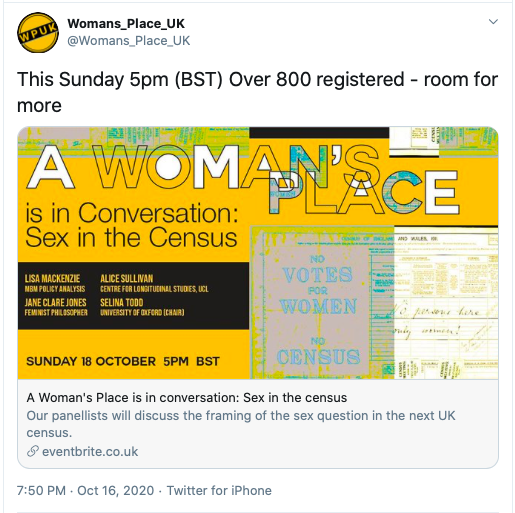
Linda ‘Slasher’ Riley chaired the ‘debate’. Linda welcomed us to the meeting, stressing the importance of inclusivity and that she supported all LGBTQI women and that all the events she’s involved with always include non-binary and transwomen. Obviously.
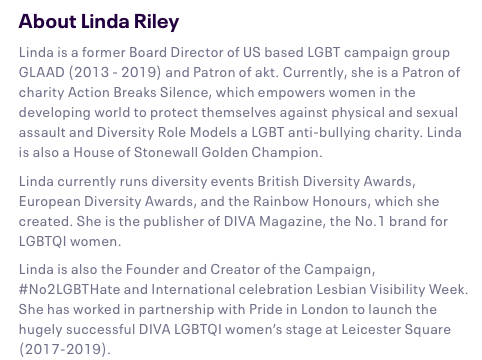
Linda’s pronouns are she/her. She was especially happy because last week her friends at Stonewall Housing announced that she was now a ‘housing ambassador’.

The gong is very important to Linda because she’s from an ethnic minority (anyone?) and had found herself homeless at 15 and wanted to give back to the community (usually this involves handing out gongs to all her friends).
Linda bemoaned the fact that during lockdown closeted teens would have been stuck in houses with their families and reflected that several of her Diva employees were unable to come out (which rings true, I wouldn’t tell anyone I worked for Diva either). We needed more togetherness. When Linda was homeless it was the community who looked after her. Trying to inject some excitement, Linda bigged up the panel.
This began with Ruth Hunt, Linnie’s great mate. ‘What’s ‘er name again?’ Linnie said playfully and introduced ‘Baroness Roof Hunt’.
Hunt tried to be jolly hockey sticks – it was inspiring to see so many inspiring and friendly faces, she said – but through gritted teeth as LGB Alliance were a noticeable presence.
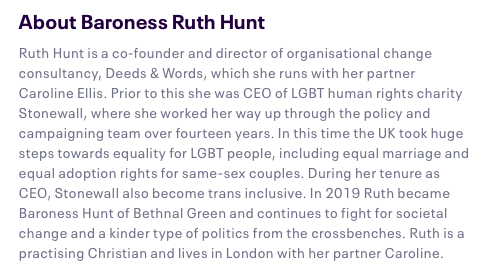
Pav Akhtar told us he works in the NHS (he’s an Equalities Lead) and that it has 30,000 LGBT staff. Pav felt that the LGBT community was an alternative to family – a ‘chosen family’.
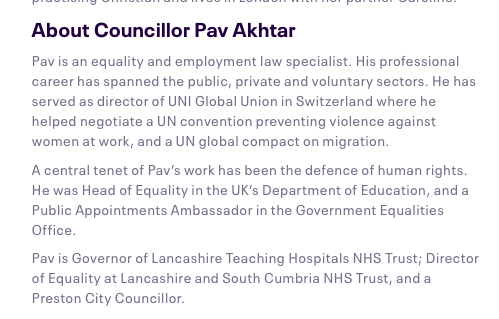
Next was Michelle Tea, memoir writer of her sex life in San Francisco but also fiction for teens. She came out as ‘queer’ in the early 90s and worked in the sex industry for a time. Michelle felt that we had to become ‘worthy’ of the ‘sacrifice that transwomen’ had made and that we needed to recognise the ‘magic’ of trans people. Oh, and sex work is work and she wanted it decriminalised. She is also the brains behind Drag Queen Story Hour.

Bobbi Pickard has ‘transformed trans awareness in BP’ with the network group Trans in the City. Bobbi told us that the last two years had been very hard for TW and NBs. Messages and conversations about trans inclusion had become more polarised, this was due to a vacuum of knowledge about trans people that the other side had been able to exploit. Society should be respectful and recognise all diversity. Giving people rights, doesn’t take rights away from anyone else. At the same time, Bobbi explained in a roundabout way that when women (referred to as ‘people’) insisted on single sex spaces, it impacted on the rights of men like himself. So much for his ever expanding pie theory. Like Michelle, Bobbi is also directly involved with peddling gender identity ideology to children in his role of Mermaids’ Trustee.

Hilariously the first of the pre-submitted questions read out was one put by panel member, Pav Akhtar, which he was also invited to answer by Linnie-love. Pav wanted to know:
How could the community ensure that the NHS take onboard LGBT+ health needs?
Pav basically wanted to get it out there that NHS England had published a ‘People Plan’ which had recommended that community-based organisations should be stakeholders in developing policy and he wanted everyone on the call to take this up. He felt that the NHS didn’t understand intersectionality. He also alleged that 49% of transgender people could not access healthcare. He felt that LGBT organisations needed to get better at engaging with statutory bodies and the People Plan was the perfect opening into this for healthcare.
Ruth Hunt said that Stonewall had gathered data on over 9,000 lesbian and bisexual women. Diva had also done many surveys (thereby giving Linnie a lovely stroke) and that so much evidence now exists about health needs (though didn’t expand on how these health needs differed from straight women). Losing the plot slightly, Hunt said that at the beginning COVID information wasn’t available in other languages, and that there had been no sign language interpreters available at the No. 10 daily briefings on COVID. The NHS was under-resourced and could not cope with increased demands.
Bobbi said that the NHS had failed transgender people for many years now. Initial appointments with gender clinics before pandemic were already over 3 years, when normally people should be seen within 18 weeks. This had gotten significantly worse through the pandemic (I know lockdown has felt like years, but it actually isn’t). He said it had been compounded by private healthcare but didn’t say way. Things like electrolysis weren’t available currently and this was having a huge impact.
Bobbi reflected said that the NHS’s fragmented management structure made it difficult to get on board and that some Trusts were more receptive than others. He felt that the NHS England People Plan was hugely important step forward.
The next question was from Tom, a student. It was something along the lines of:
What are the best ways for queers to help other queers in hostile environments, e.g. the workplace?
Rav told Tom the student that it takes a great deal of courage to be out in workplace. Rav had personally found great solace in establishing LGBT network groups. Families weren’t always supportive of us, so we rely on social networks inside and outside of work. Or else Tom the student could join an industry based network if he didn’t want to join the one at work.
Michelle was sorry Tom the student was in a bad place. Outside networks were important. So many ways to reach out to other queer people. What form was the hostility taking? Could he go to Human Resources? Look for a new job if necessary and make sure it has a queer-friendly ethos.
Bobbi said it was a great question and had been ‘working for a couple weeks on this question’. Bobbi observed that people come out at Uni and then when they get their first job they go back into closet. Bobbi felt that young people were the ‘voices of the future’ and would be eventually ‘running our society’ (this was presumably the revelation he had spent two weeks working on). He also urged us: ‘Don’t listen to an old bag like me’. He said that Tom the student could contact him via Big Tent so that he could give him some help. Let’s hope Tom takes up his recommendation of not listening to him.
Ruth Hunt advised joining a trade union as they have LGBT networks too and could give practical help, and/or join a political party.
Head of Policy and Public Affairs at the Terence Higgins Trust, Richard Angell, also got a pre-submitted question answered.
Is it possible to end HIV transmission in the UK by 2030? And what needs to be done to achieve this?
Bobbi thought free access to pre-exposure prophylaxis (PrEP) was really valuable.
Hunt observed that Richard already knew the answer (i.e. PrEP) and was an expert in the area. She added that sex education in schools and vaccines were important. Hunt said that poverty causes high risk behaviour, but didn’t explain why. (Surely it’s PrEP itself which encourages high risk behaviour?)
Pav said that PrEP availability had to improve and needs to happen. Challenging the stigma of HIV was important and alleged that it was a big issue still.
Needless to say no one mentioned condoms, modifying behaviour and regular testing for those who sleep around.
Then questions were opened up to those on the call. Sue Pascoe asked:
Over the last three years the EHRC (Equality and Human Rights Commission) had failed to protect trans people and allowed misrepresentation abound – was his description accurate?
Pascoe was presumably spitting feathers over this recent EHRC report which clearly shows that the majority of women are not happy with men, who identify as transgender, accessing female specific spaces and services. EHRC has been shy to unequivocally back the current Equality Act 2010 in terms of single sex spaces and has certainly done their best to promote trans activist voices. Earlier that day Liz Truss had appointed a new EHRC Chair, Baroness Falkner.
Bobbi agreed that the EHRC had let down trans and queer people and that it was an utter disgrace that the government, in the middle of pandemic, had introduced harmful rollbacks of transgender peoples’ rights. It wasn’t just the Tories either, Bobbi felt that other parties hadn’t stood up for trans people, except the Lib Dems and the Green Party.
Hunt said that the EHRC had not covered itself in glory with all sort of LGBT issues and was looking forward to meeting up with Baroness Falkner. Hunt said that in the past the EHRC had been ‘technically and legally incorrect’ and that she expected better and was confident they were moving in right direction on legality, but she didn’t specify what legal issues she was referring to.
Pav guffawed and said he wanted to be ‘diplomatic’ and felt the EHRC had more work to do.
Yet again Michelle, as an American, had no idea about UK issues. From her perspective as a writer she wanted to challenge and debate, but some things weren’t debate-able. Trans rights were not debate-able. A magazine editor had wanted her opinion on the topic and she explained that such an article would be transphobic and persuaded them to pull the article.
The last question was along the lines of:
What can UK LGBT organisations do to improve violence and discrimination against LGBT people in other countries?
Hunt said this was a very important subject and came out with some fluff about listening to activists on the ground. But also the UK could not fall behind other countries and currently we had fallen behind Argentina and Malta. She plugged her dreary book about queer faith and said that faith was often used as an excuse for inequality (which is funny because now equality and diversity is used as an excuse for inequality, a narrative she’s played a major part in).
Pav felt that ‘family values’ was some sort of smokescreen for the far right. He felt that individual projects should be supported and funded so that litigation could take place in problematic countries. Rav said that Pakistan had given trans people passports and the right to inherit, implying that Pakistan was more progressive than the UK, but sadly failed to mention that sex between men carries the death penalty, and indeed many men identify as transgender in order to save their own skins. Rav also felt the UK needed to support LGBT asylum seekers better and be ‘world leaders’.
Michelle said that the Trump administration had rolled back many rights and that life was very hard for queer people currently in the US. Boo hoo.
Bobbi said that business played a role in initiating conversations – especially in places where it was illegal or carried the death penalty. Global businesses were becoming more confident in standing up and expressing their values, for example 130 businesses in the UK had just co-signed a letter to the Government regarding the abandonment of the Gender Recognition Act reforms, 70 of which had written a letter to the Prime Minister. Bobbi bewailed the ‘fact’ that the Government were actively trying to roll back trans rights and that we shouldn’t pretend that things were great. Bobbi was less forthcoming on what BP et al had actually done about human rights abuses in oil rich countries in the Middle East.
Then it was time for Linda to wrap up the ‘debate’ and repeated that she’d been delighted to chair it. She hoped in 30 years things would be better for trans people and invited the panellists to give their final thoughts.
Pav – thanked people for their thoughtful questions and responses (especially his own I suspect). More unifies us than divides us. Diversity is a fact of life. Sounding over-emotional Pav told his ‘trans siblings’ that ‘Black Pride stands with you’ and that ‘we will stay with you’.
Michelle was honoured to be on the panel and the beautiful thing about being queer is the sense of connectedness it gives you. I think a Stonewall employee, their awful ‘bisexual role model’, thanked Michelle for her writing – just shows how cosy it all was.
Bobbi had learnt a lot and also thought it was amazing to be on the panel. The beauty of nature was diversity and that if only we could be more tolerant the world would be more harmonious. His love of nature explains why he chose a career in the oil industry and a path onto exogenous hormones.
Hunt thanked Linnie-love for being an ‘amazing chair’ and said the next few months would be tough and that we should reach out to someone who is alone. Also that if someone has to be cruel to make a point, it probably isn’t a very good point. (Absolutely zero logic with this one.)
The room was then left open for participants to ‘mingle’ as they would if they were in the real Big Tent. Ruth Hunt got out of it pretty sharpish, claiming she had a further appointment.
Andrew Boff wanted to know why there were so many ‘nasty savage comments’ from older gays and lesbians and wondered why they couldn’t see they were ‘using the same kind of language’ used against gays and lesbians 40 years ago. How could we tackle that?
Bobbi responded ‘it’s education’ and noted that Kate Harris from LGB Alliance would disagree with him. People don’t understand what it is and TW aren’t understood, said Bobbi.
Kate responded the LGB Alliance had the support of some transsexuals and that they were seeking to have a debate, but none of their questions were ever allowed at events like this.
Michelle Tea erupted with anger well before Kate finished her sentence, and began a diatribe lasting several minutes, in which she very effectively used broken record technique, shouting and talking non-stop. I tried, as best I could, to catch what she said.
‘YOU CAN’T SAY THAT PEOPLE CAN’T EXIST … DON’T PRETEND THAT IGNORANCE IS INNOCENT … WHITE SUPERIORITY … I’M NOT GOING TO EDUCATE YOU AS TO WHY PEOPLE OF COLOUR ARE HUMANS … I DON’T NEED TO SPEAK WITH YOU IN DEBATE … YOU NEED TO GET OUT OF HERE … SUCH A HUGE SURGE OF RACISM … PEOPLE NOW FEEL LIBERATED TO DO IT … ‘
She got quite quite off topic.
A woman repeatedly asked Michelle to stop shouting and allow Kate Harris to speak but Michelle was in full flow. The Big Tent moderator timidly suggested that things were a tad aggressive, but steered clear of telling Tea to shut it or chuck her off the call.
Linda Riley then huffed that the voice of the working class was missing and that she wasn’t going to be lectured or put down by hateful middle class people any longer, using it as an excuse to leave the Zoom call sharpish.
The Big Tent moderator then said she was going to shut things down. Tea was still frothing at the mouth, the woman (who LGB Alliance have confirmed was not known to them) was still telling her to shut up, and then Michelle suddenly left the call saying ‘goodbye’. The moderator warned again that things were out of hand and she would close it down.
Then, in a moment of what Bobbi wanted us to think was magnanimity, said ‘Let Kate comment’. Kate said the LGB Alliance support fact-based evidence but didn’t support gender identity politics, that there was concerned about the 4,000% increase in females transitioning and that a Cambridge University study suggested that 90% were lesbians. LGB Alliance supported transsexuals as already set out in law.
Bobbi of course wasn’t prepared to debate really and said that the terminology which had been used was too offensive to allow him to debate. Then I had to go myself as my boss came into the room! I imagine the bun fight continued for a few minutes thereafter.
So, in conclusion, the panel failed to debate any salient issues to LGBT+ mental health in direct relation to COVID. Certainly no one mentioned anything about dealing with death or grief, suggesting that, if anything, LGBT were much less affected than other groups, being mainly younger and middle class perhaps? I can’t think of any specific issues which affects LGBT people in relation to the pandemic, as loneliness, job losses, restriction to healthcare, etc, are affecting everyone across the board. The current case bought by Keira Bell against the Tavistock wasn’t mentioned, nor were the reasons the Government had given against pursuing GRA reform. Most damning though was the incestuous nature of the call and the only questions allowed were the ones that the panel wanted asked. It was not a debate.

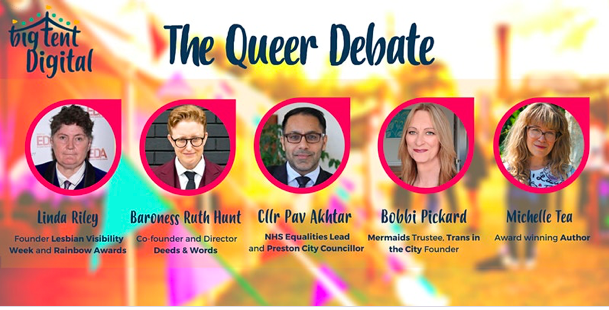
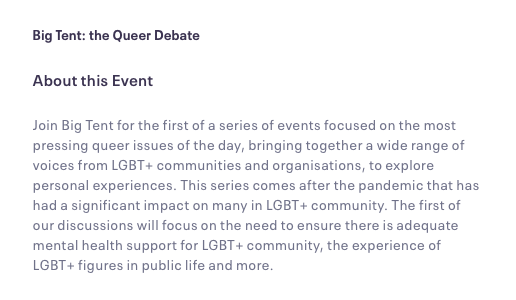



I also hope that things get better for transpeople – but they will only get better if they stop all this trans bollocks.
LikeLike